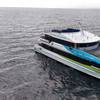Companies Capitalize on Warming Waters
Norilsk Nickel is building its own fleet of ships to capitalize on the melting of the polar ice caps.
The company ordered five reinforced cargo vessels that can plow through the waters north of as new sea routes open. Moscow-based , the world's biggest producer of nickel, is spending at least $467 million to buy reinforced vessels rather than rent both freighters and icebreaker escorts.
Global warming, while threatening environmental disasters, is creating economic opportunity for ship owners, makers of ocean cargo vessels and tour operators. New routes may expand access to the world's second-biggest oil supply, deliver wheat to 30% faster and increase Arctic tourism as much as 50% in a decade, Bloomberg reported.
's Aker Yards and 's Samsung Heavy Industries Co. are producing ships for such Arctic investors as oil refiner ConocoPhillips and metal producer OAO GMK Norilsk Nickel.
Temperatures above the have risen at about twice the rate of the global average in the last three decades, United Nations data show. Arctic sea ice shrank to the smallest area on record last summer, covering 22% less than the previous low in September 2005, said the U.S. National Snow and in
is shipping nickel, copper and palladium north of Siberia to Europe from the Taimyr Peninsula in . One reinforced ship is already in service and four are being built by Aker Yards for delivery by mid-2009, all using new hull designs that allow for bow- or stern-first sailing, depending on the thickness of the ocean surface.
The next most likely route to open is a straight line across the magnetic North Pole, bulldozed by a new generation of ships. That course would save 4,000 miles and 11 days compared with an 11,000-mile, one-month trip between and , , via the .
The shorter route also would shave $800,000 from the cost of sailing a Panamax class, 75,000-deadweight-ton freighter, broker Howe Robinson & Co. said.
The number of voyages in the Canadian Arctic jumped to 132 last year from 78 in 2005, according to the Canadian Coast Guard.
Investment is underway. The portion of the world's commercial tankers that can ply frozen waters will rise to as much as 10% this year from 3% in 1992, broker Clarkson estimated. As of December, the order backlog for reinforced ships stood at 152, almost half the size of the current worldwide fleet of 352 such vessels.
Source: Bloomberg














